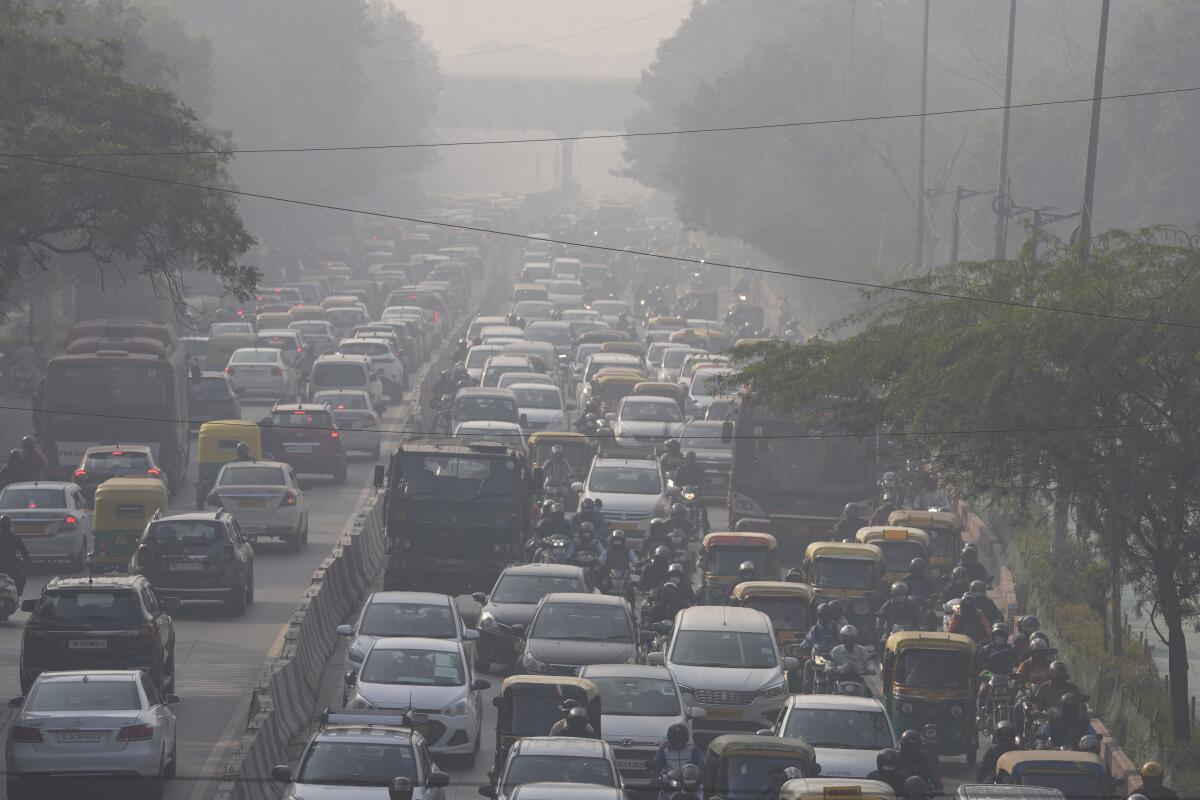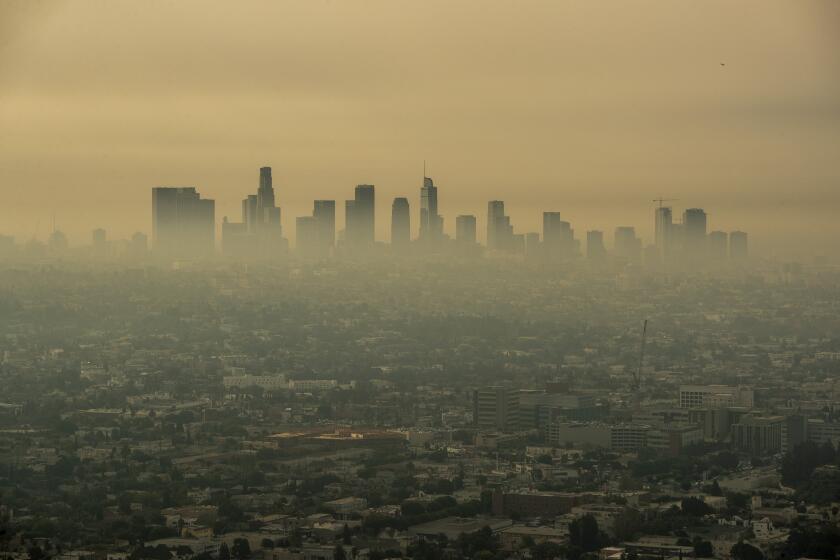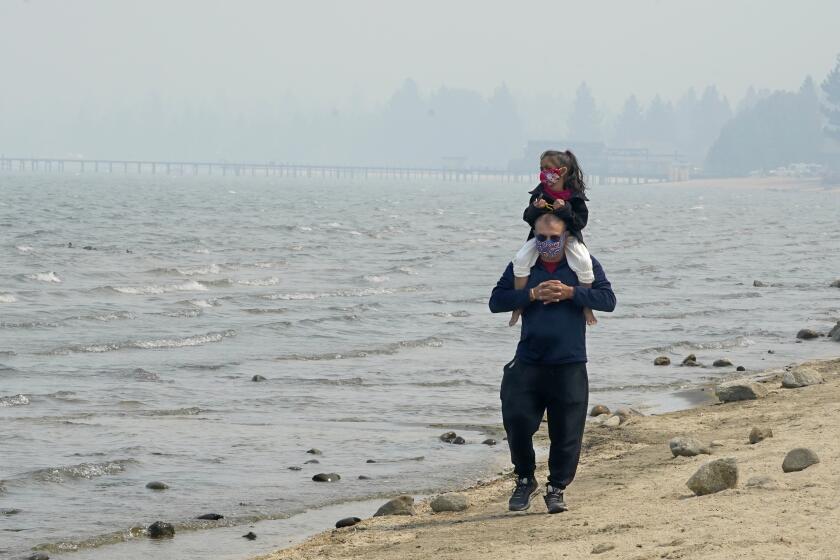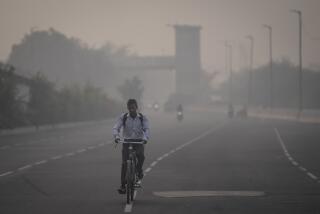Smothered by smog, New Delhi closes schools and power plants

- Share via
NEW DELHI — Schools were closed indefinitely and some coal-based power plants shut down as the smog-shrouded Indian capital and neighboring states invoked harsh measures Wednesday amid considerations of a lockdown to combat worsening air pollution.
India’s top court is deliberating a lockdown in New Delhi, which would be the first of its kind in the country to curb pollution and not to control coronavirus infections.
It’s not clear how far it would go, but New Delhi’s government has already shown its willingness to impose an emergency weekend lockdown, similar to the lockdowns implemented to halt the spread of COVID-19. It’s now waiting for the Supreme Court’s decision, which could come as early as Nov. 24.
The government is discussing whether to keep industries operating. Some experts say a lockdown would achieve very little in controlling pollution but rather would cause disruptions to the economy and negatively affect the livelihoods of millions of people.
“This is not the solution that we are looking for, because this is hugely disruptive. And we also have to keep in mind that the economy is already under pressure — poor people are at risk,” said Anumita Roychowdhury, executive director at the Center for Science and Environment, a research and advocacy organization in New Delhi.
Even so, soaring pollution levels in the capital prompted a federal environment ministry panel to issue strict guidelines Tuesday night to stem pollution and to show residents that the government was taking action to control an environmental crisis that has been plaguing the capital for years.
We’ve seen how beautiful our clean-air future can be. Regulators need to do more to make it a reality.
Besides the closure of schools, the federal Commission for Air Quality Management ordered a stop to construction activities until Sunday and banned trucks carrying nonessential goods. The panel also directed the states to “encourage” work from home for half of the employees in all private offices.
Despite some improvement in New Delhi’s air over the past two days, readings of dangerous particles Wednesday were still as high as seven times the safe level, climbing above 300 micrograms per cubic meter in some parts of the city.
The World Health Organization designates the safe level for the tiny, poisonous particles at 25.
Forecasters warned that air quality would worsen before the arrival of cold wind next week that should blow away the smog.
Here’s some advice for keeping the air in your home clean when wildfire smoke has made outdoor air quality hazardous.
Earlier this month, air quality levels in New Delhi were categorized as “severe,” and residents faced bouts of bad pollution lasting days. The situation prompted a stern warning last week from India’s Supreme Court, which ordered state and federal governments to take “imminent and emergency” measures to tackle what it called a crisis.
Among the many Indian cities gasping for breath, New Delhi tops the list every year. The crisis deepens particularly in the winter when the burning of crop residues in neighboring states coincides with cooler temperatures that trap deadly smoke. That smoke travels to New Delhi, leading to a surge in pollution in the metropolitan area of more than 20 million people.
Emissions from industries with no pollution-control technology, pollutants from firecrackers linked to religious festivals and dust from construction also sharply increase in winter months.
Several studies have estimated that more than a million Indians die every year because of air-pollution-related diseases.
Start your day right
Sign up for Essential California for the L.A. Times biggest news, features and recommendations in your inbox six days a week.
You may occasionally receive promotional content from the Los Angeles Times.
The capital has often experimented with limiting the number of cars on the road to lower vehicular emissions, using large anti-smog guns and halting construction activity. But the steps have had little effect.
Residents say the government isn’t doing enough.
Suresh Chand Jain, a New Delhi shop owner, said authorities should introduce stricter regulations aimed at limiting car use and controlling the burning of crop residues in neighboring states, emissions of which contribute hugely to the capital’s bad air quality.
“Shutting down the city will not end the pollution,” said Jain.
Experts say such emergency measures are not helpful in the long run.
“These are done only to ensure that you don’t worsen the situation, that you shave off the peak. But it is not a silver bullet that is going to just clean the air immediately,” said Roychowdhury of the Center for Science and Environment.
More to Read
Sign up for Essential California
The most important California stories and recommendations in your inbox every morning.
You may occasionally receive promotional content from the Los Angeles Times.












